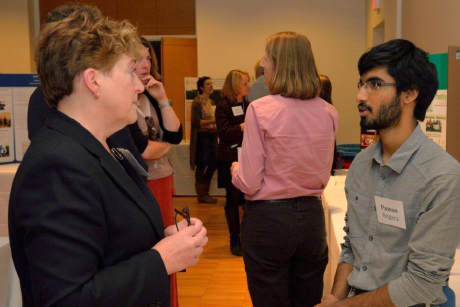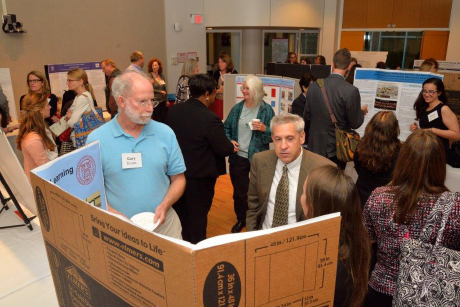Cooperative Extension interns report on statewide research
By Caitlin Harder


On Oct. 7, 26 students from the College of Agriculture and Life Sciences (CALS) and College of Human Ecology (CHE) gave one-minute “lightning” presentations on topics ranging from helping New York farmers adapt to climate change to market testing alternative sap products and offering classes to second-time parents.
The presentations were followed by a poster session that outlined what the students learned through research conducted during the Cornell Cooperative Extension Summer Internship Program.
Pawan Angara ’16 conducted research on spotted wing drosophila, an invasive species that lays its eggs in otherwise viable fruit, creating significant losses for organic farmers in the Hudson Valley. Angara spent his summer developing a gel that attracted the insects to a location where they could be exterminated.
Angara discovered that field research doesn’t always go as planned. “You have to adapt and work with the tools you have on hand, rather than what you wish you had,” he said. “I definitely was inspired by all the innovation I saw in the lab and the quick thinking that went on. When you’re in the field, you can’t just drive back to the lab to get something you forgot.”
This was his second summer participating in the program. “Every year I see more and more people doing great things for the community and great things for the world through research,” he said.
Lindsay Dower ’15 updated a curriculum on nutrition and fitness and taught modules to middle school children in Canandaigua. Applying the research of Valerie Reyna, professor of human development, Dower tested a theory that learning by understanding overarching ideas is more effective than memorizing facts. “I learned so much about the research process and, beyond that, how to work with different groups and types of people … and I definitely strengthened my leadership skills,” Dower said. She is continuing her research in Reyna’s Laboratory for Rational Decision Making this academic year.
Food science major Susana Jimenez ’15 spent her summer in Wayne County working to increase participation of traditionally underrepresented Latino children in local educational opportunities. Building on the research of CHE senior lecturer Pilar Parra, Jimenez conducted interviews and focus groups and learned that parents and caregivers in the rural area showed high interest in extension programs. She identified and evaluated sites, learning that hosting programs in familiar spaces with established community leaders, such as Catholic churches, increased program participation. She said these groups wanted to learn about nutrition and food safety, but they were open to many of kinds of programs. “It’s not so much what you teach, but where and how,” she said.
Since its establishment in 2007, the Cornell Cooperative Extension Summer Internship Program has expanded from five student projects to 26.
Caitlin Harder is a writer intern for Cornell Cooperative Extension.
Media Contact
Get Cornell news delivered right to your inbox.
Subscribe